Entering 2023, global plastic pollution prevention and control policies are becoming increasingly stringent, and related plastic restriction measures are being upgraded. In the global green economy, "reduce" and "recycle" are still two of the most widely used strategies, and the recycling movement in Europe and the United States is in full swing. Given the differences in the problems and infrastructure faced, the goals and strategies differ from country to country.
Recently, the "Deposit Return System" recycling model has re-emerged in the North American or European market with the goal of promoting the effective recycling of plastic bottles and thus reducing the environmental impact of waste plastic bottles.
To meet the EU target, Austria will introduce a deposit system for plastic bottles and cans in 2025.
Turkey will develop a deposit system for single-use beverage packaging in 2023, to be implemented from 2024.
The UK government will also launch a deposit system for implementing plastic bottles and cans, which officially begins on October 1, 2025.
Many experts believe that deposit systems are a key way to reduce single-use packaging waste generation, especially in the food and beverage industry. The mechanism is simple: consumers pay an additional deposit of a fixed percentage or denomination when they purchase any bottle of beverage, and redeem the deposit when they return the bottle. The implementation of the deposit system can help achieve the socialization of low-value packaging collection, avoid secondary pollution, and effectively improve the safe recycling rate of disposable packaging.
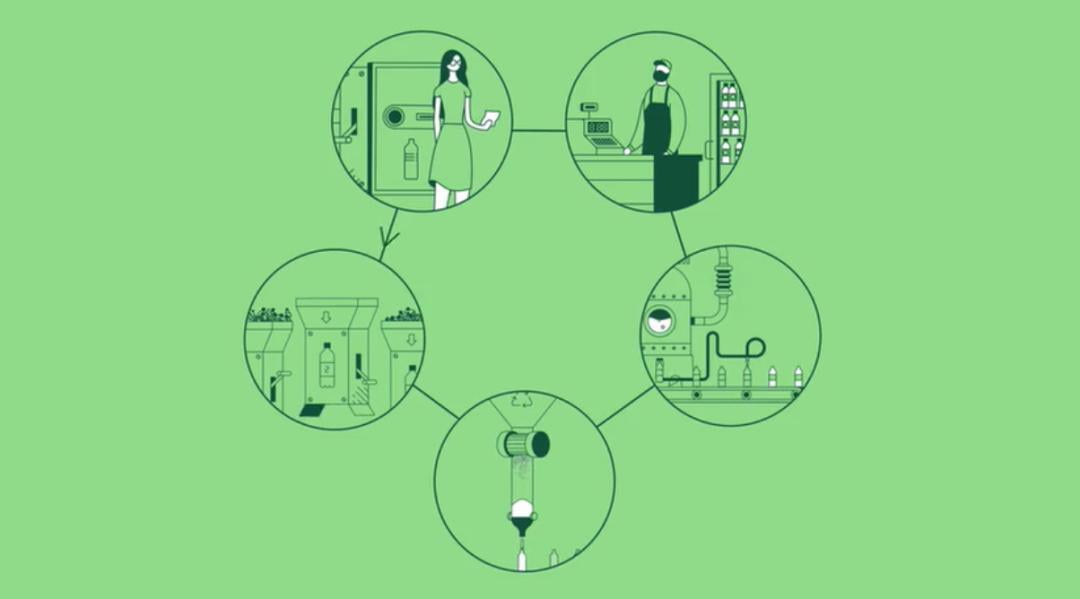
The deposit system is a mature institutional tool, an important mechanism for practicing circular economy, and the best embodiment of extended producer responsibility. This solution, which encourages consumers to return empty bottles and containers, is a win-win for everyone, but not always easy to implement. Nevertheless, there are abundant success stories from around the world.
An overview of the global practice of the deposit system. Over 700 million people are expected to participate in the deposit system in 26 years
Currently, more than 50 countries and regions around the world have implemented deposit systems. European countries such as Germany, Finland, Denmark and Lithuania have long supported and implemented deposit systems with considerable results. Lithuania, in particular, has become a textbook case study: before the deposit system was introduced in 2015, 113 bottles and jars were wasted per capita per year, one every three days; in 2017, one year into the deposit system's operation, that number dropped to 14. Lithuania's practical experience strongly demonstrates the effectiveness of the deposit system in increasing the recycling rate of beverage packaging.
In its 2021 report What We Waste, the European environmental agency Reloop explores for the first time the possible impact of adopting a deposit system on scrap recycling and how it might work in synergy with the refillable (refill) model. The report shows that even a deposit system or refillable (refill) model alone still has a significant effect on driving scrap recycling.
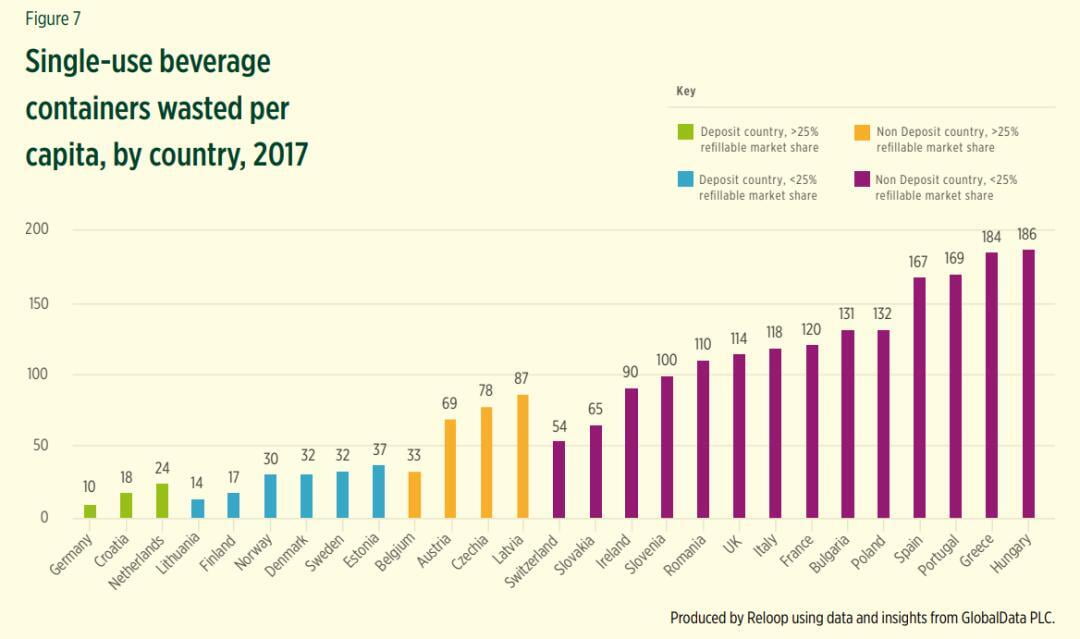
Green for areas with deposit and refillable models, blue for areas with deposit only, orange for areas with refill only, and purple for areas without both models
Disposable beverage containers wasted per capita by country in 2017
In Reloop's new report, Global Deposit Book 2022: An Overview of Deposit Systems for Single-Use Beverage Containers, the report provides a comprehensive summary of the more than 50 deposit systems already in place in Europe, North America, Central America and the Caribbean, Africa, the Middle East, Asia and Oceania, as well as projects planned for implementation by the end of 2023.
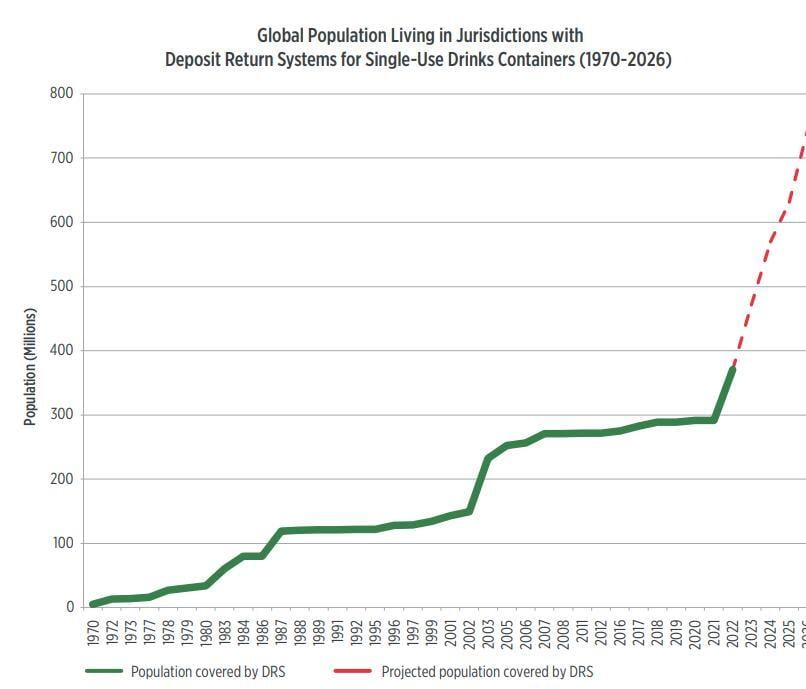
Global population living in the area where the deposit system is implemented
The report predicts that as global interest in deposit systems continues to grow, approximately 748 million people could be living in countries or regions with deposit systems in place by the end of 2026, a number more than double the population covered by the end of 2022.
For more than 200 years, deposits have been used to encourage consumers to recycle or refill empty bottles. In 1970, the world's first legally binding deposit system for single-use beverage containers was created in British Columbia, Canada. The earliest deposit systems tended to use small deposits and only accepted a limited amount of recycled material, and relied on a return-to-warehouse model for doing so (i.e., setting up specific recycling points).
Beginning in the 1980s, as the concept spread to Europe, particularly Scandinavia, the deposit system evolved from the 1980s to accept a broader list of beverage packaging materials, higher deposit levels, and a return-to-store model - in other words, recycling directly at the store where the beverage is purchased.
Data from the report shows that the return to store model has an average recycling rate of 90%, while the return to warehouse model has an average recycling rate of 69%. The advantage of stores practicing the deposit system over the return to warehouse model is that merchants who can find a simple and effective format, such as an automatic recycling machine placed in the store, will return to the store again when customers recycle, generating spending potential.
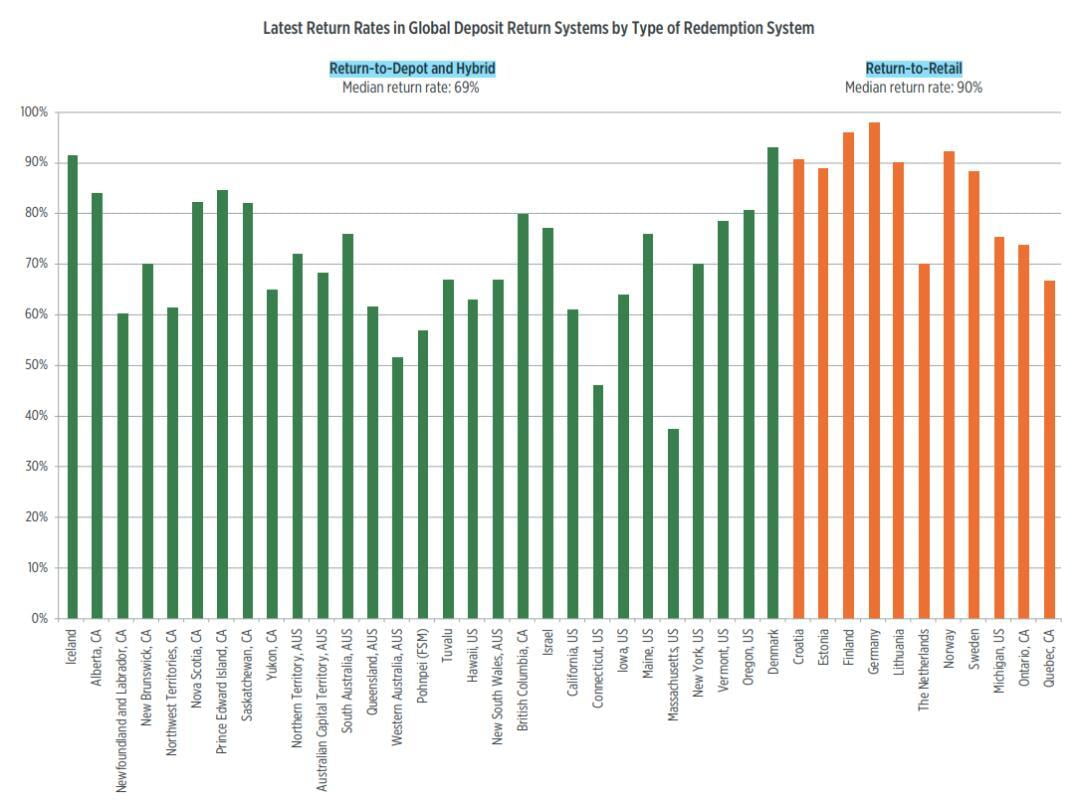
Recovery rates for the two return modes
In addition to this, a comparison of deposit systems in different regions shows that the more expensive the deposit, the higher the average recycling rate. The deposit system usually ensures a recovery rate of over 76%, with Germany having the highest recovery rate of 98%.
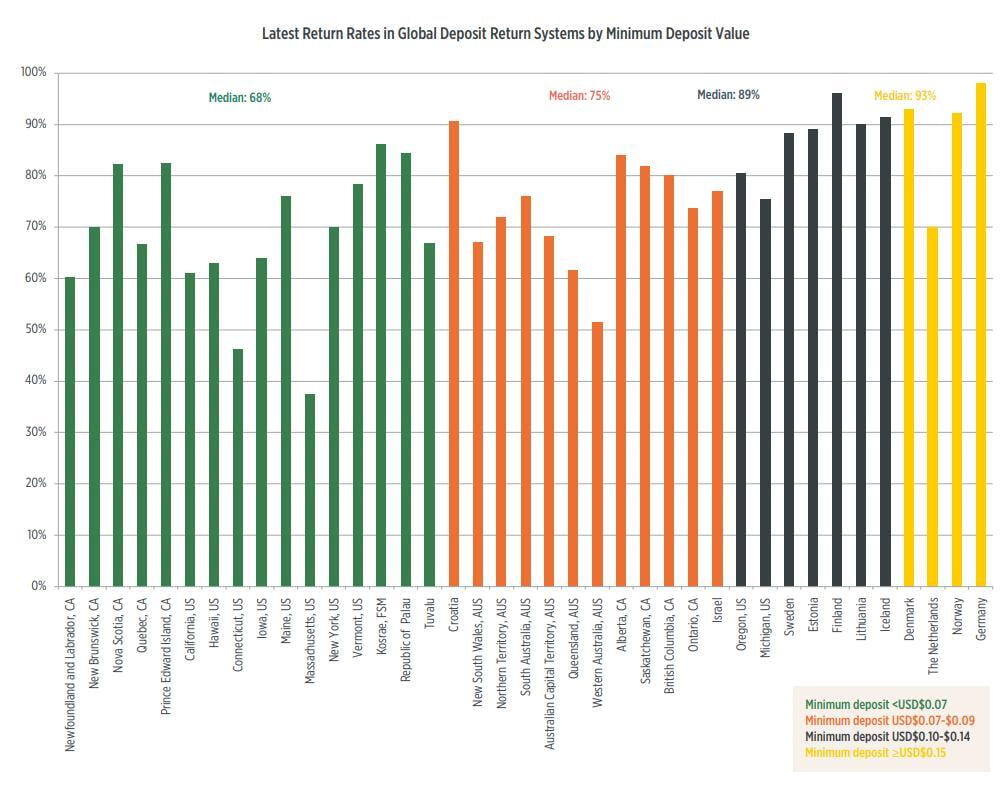
Recovery rates by region
According to Reloop CEO and co-founder Clarissa Morawski, no other collection method can close the loop on 90 percent of beverage containers like a deposit system, which explains why governments around the world are showing new interest in deposit systems.
"Recycling empty beverage containers, whether through refillable (refill) or deposit return systems, significantly reduces waste, which means fewer cans and bottles are thrown away. These methods reduce cleaning costs for local governments, promote jobs in the circular economy and reduce carbon emissions. From the consumer's perspective, implementing a deposit system is likewise a win-win; if you return your empty bottles, you get your deposit back."
The practice of deposit systems with the highest recovery rates. What are the lessons learned?
Now the implementation of the deposit system more and more countries, from the implementation of the scope of the deposit system is mainly implemented for beverage containers, lead batteries, end-of-life vehicles and other species.
Taking beverage containers as an example, let's take a detailed look at the German Pfand System deposit system in practice. Germany's deposit system began more than 20 years ago, when only some beer types and mineral water introduced such a system, and soon milk bottles also began to adopt the Pfand System.

Later, environmental awareness gradually rose and society at large got used to this system. In 2003, Germany became the first country in Europe to introduce a deposit system for the recycling of plastic bottles, glass bottles and cans.
Now, if you walk into any supermarket in Berlin, you will always see customers at the entrance with large bags of empty bottles busy in front of the bottle return machine. 0.25 Euros for disposable plastic bottles and 0.15 Euros for reusable plastic bottles ...... After all the bottles have been put out, the customer will receive a cashback coupon, which has been paid at the time of purchasing a bottled drink The deposit for the purchase of the bottle.

A deposit is required for bottles with these Pfand logos
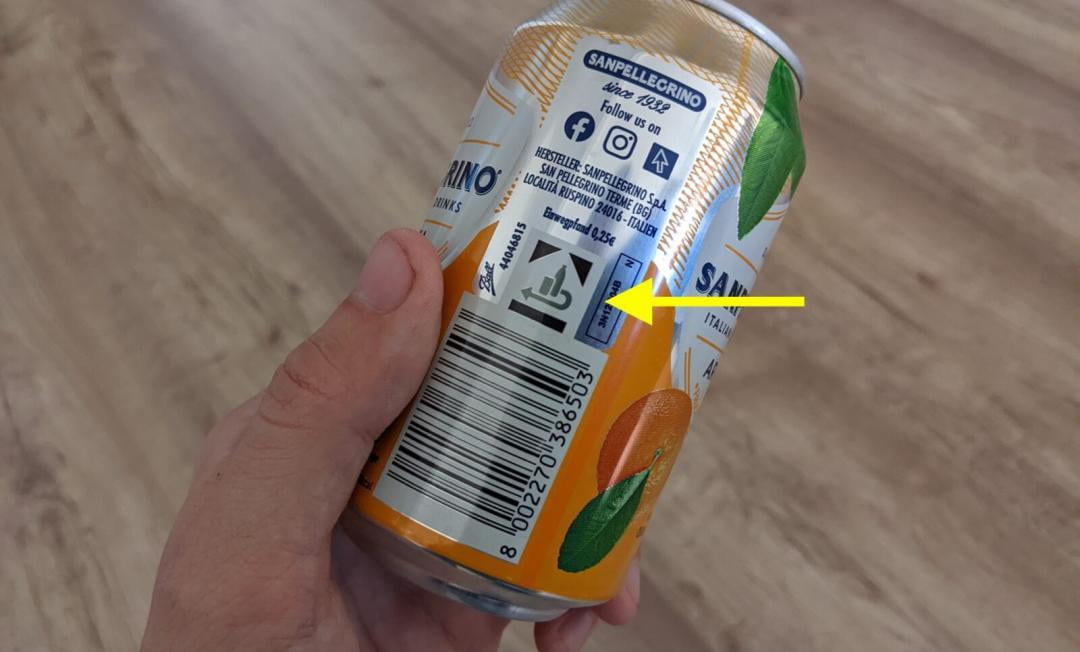
Today, this beverage bottle recycling policy has become a unique example of the circular economy in Germany. And this policy also has a new twist from January 2022, with a deposit for almost all single-use packaging of bottles or cans of beverages.
What are the lessons to be learned?
1. Adopt laws to clarify the responsibility of recyclers for recycling and implement a deposit system
Countries have made it clear in the law that producers are responsible for the recycling of waste products, set a recycling rate target for manufacturers, and require manufacturers to build their own recycling systems or join recycling organizations to fulfill their recycling responsibilities. At the same time, the law also clearly proposed to complete the recycling rate target by levying a deposit, some also provide for a specific deposit amount, such as the German "Packaging Act" "Battery Act", Finland "Beverage Packaging Act" and other relevant provisions, to provide legal protection for the implementation of the deposit return system.
2. Deposit return system only for appropriate products
The deposit return system is not applicable to all products. Therefore, China's exploration of the deposit return system should be considered from the perspective of maximizing the benefits to resources, the environment and society from the product's own characteristics and the current situation of recycling treatment, especially considering the current status of China's recycling system.
3. Encourage to join the common recycling organizations to carry out unified recycling
Since the cost and burden of manufacturers to build their own recycling network is too high, foreign laws provide that manufacturers can fulfill their producer recycling responsibility by building their own recycling network or joining a common recycling organization. At present, Germany, Sweden, Finland and other EU countries have set up several common recycling organizations, such as the beverage packaging dual recycling system and battery common recycling system in Germany, Returpack in Sweden, PALPA in Finland, etc., instead of producers specializing in waste product recycling.
We need more than a deposit system for disposable beverage packaging
A study by the European Court of Auditors (ECoA) shows that the legally mandatory introduction of a deposit system for PET beverage containers in every European country could be a key tool to meet the minimum recycling requirements set by the Single-Use Plastics (SUP) Directive (77% by 2025 and 90% by 2029).
According to Zero Waste Europe, the deposit system required by law should apply to all types of materials (plastic, glass, aluminum, etc.), not only limited to beverage containers, but also coffee cups and food containers.
In May 2020, South Korea introduced a deposit system for coffee cups and take-out food containers. According to an article in the Korea Herald, the deposit system should go into effect in 2022, and according to the Korean Ministry of Environment, the new law will also help reduce carbon dioxide emissions by 66 percent, making an important contribution to climate change mitigation. In addition, the program will generate $36 million in annual economic benefits and will work with manufacturers and distributors to reduce consumer inconvenience to ensure that cups are recycled across the country, according to the Korea Herald.

